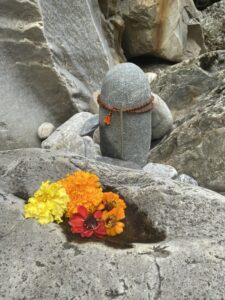I once asked Baba Hari Dass, “Does the world exist outside of our minds?” I had been contemplating the relationship of the outside world to my inner environment, and I wondered just what was “out there” triggering the electrical activities of my brain.
“Yes,” Babaji replied, the world does exist outside of one’s mind. “But not in the way the mind thinks.”
I inquired further, “Not in the way the mind thinks?”
He answered that the mind cannot think or perceive clearly. He wrote, “The world the mind sees is colored with likes and dislikes.” He gave an example, “A man falls in love with a woman and thinks she is beautiful. Later he is angry with her and then she looks ugly. She was never beautiful or ugly, only in the man’s mind.”
“What does the world look like without the coloring of likes and dislikes?” I asked.
Babaji answered, “Too find out what a mango tastes like you must taste it for yourself.”
The practice of yoga helps one develop the ability to “taste the mango.” Yoga clarifies the mind and nervous system so one’s perceptions become increasingly pure and subtle, affording spiritual vision. The person without a clarified perceptual system sees his desires and attachments, his likes and dislikes, his problems and solutions, as being out in the world, outside of his own mind. He therefore feels powerless, at the mercy of external forces more potent than himself which twist and turn regardless of his wishes or safety.
A traditional analogy used to portray our misperception of reality is that of the “rope and snake.” We see a rope lying on a road and become frightened because it appears to be a coiled snake. We then run around endangered and confused as to how to deal with this ominous snake. The only solution to the problem of the snake is the realization that the snake does not exist. All the fear and confusion are solely the byproduct of false perception. Nothing needs to be done about the snake; the solution lies within the one who perceives the snake.
Deep in our hearts, we feel a nagging sense of self-doubt and dissatisfaction. We long for a way out of our fear and confusion, but we aren’t sure where to turn. When someone comes along and tells us that our problems are based on misperceptions, we find some way to dismiss the message. After all, what could be more obvious than the danger that exists because of the snakes in our roads?
Anyone who is in a space to read this has arrived at a stage where, at the very least, he is beginning to question the conditioning he has received at the hands of the world. This conditioning reinforces the perception of snakes in the road and validates fear as a method for addressing the menace. A way of understanding spiritual practice is that it gives one the courage to ignore the screeching yelps of those who are frightened of snakes. Then one can proceed closely to what lays on the road and, with clarified vision, decide for himself what is real.
There are some sure signs that we are misperceiving reality — anger, fear, confusion, and selfish desire. We can justify these in innumerable ways, but as long as we cling to the righteousness of our misperceptions we will not find any degree of peace. There are also clear indicators that we are perceiving reality. Two that I have come to consider benchmarks of right vision are compassion and a sense of humor.
Compassion arises from right-vision because one finds it easy to empathize with those trapped in the terror of their own imagination. One who has become free of the pain of limping along life’s path with a thorn in his foot, will not run off to play once the thorn is removed. His desire becomes to see his brothers and sisters also free of pain. Once one’s vision is healed and corrected, one only wishes to share this beautiful vision with others. The more who share in love’s vision, the larger the number dancing in the ballroom of love.
As for a sense of humor, even a glimpse of the unreality of the snake affords one a profound giggle. What could be sillier than recognizing that we have been crying and complaining over something that was never there? What buffoons we have been, all to protect ourselves from a snake that never existed. Like a child experiencing a nightmare, we became so overwhelmed by our mental creations that we mistook them for reality. We forgot our spiritual identity and began to think of ourselves as mundane personalities under threat, requiring defenses against the world and others. How silly!
Let those of us who desire peace for ourselves and our planet accept responsibility for the world as we see it. None of us are perfect. As the Buddhists say, even the Buddha, in all his glory, is only half-way to the goal. Though we make mistakes, we retain the opportunity to clear our vision of illusory perceptions by purifying our minds and hearts. Then the dry crumbs of fear and anxiety which form our illusory daily bread may be transformed into a vision of divinity. This will allow us to taste, for ourselves, how delicious is the mango.




